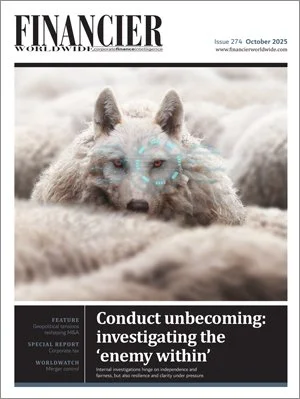Compliance tightrope: balancing cross-border risk
October 2025 | FEATURE | RISK MANAGEMENT
Financier Worldwide Magazine
In today’s globalised business environment, many organisations operate across borders, outsource parts of their operations or expand into international markets. While such expansion offers unprecedented opportunities, it also significantly increases regulatory complexity, creating the challenge of maintaining compliance across multiple jurisdictions. For general counsels, managing legal and regulatory obligations in various countries is more demanding than ever. The stakes have never been higher, and the margin for error has never been narrower.
The hidden price of going global
Navigating modern compliance obligations is increasingly difficult for multinational companies and financial institutions. The diversity and complexity of regulations across jurisdictions present substantial obstacles. Despite these challenges, organisations must demonstrate a strong commitment to legal compliance, risk management and ethical conduct. Failure to do so can result in serious financial and reputational consequences. In an interconnected world, a single compliance failure in one region can trigger a domino effect, impacting operations and partnerships across continents.
Ensuring compliance across borders helps minimise legal penalties and enhances a business’s global reputation. To navigate this complex terrain, companies must adopt robust compliance measures to sustain growth and gain a competitive edge. However, this process is often time consuming and costly. Over the past decade, marked by economic, geopolitical and health-related headwinds, businesses have operated in increasingly turbulent conditions. Significant shifts in international trade have introduced a complex web of cross-border compliance obligations that companies must manage to survive and thrive in the digital economy. The ability to adapt swiftly to regulatory changes has become a hallmark of resilient organisations.
Events such as Brexit and the implementation of landmark sales tax legislation in the US have ushered in a new era of cross-border complexity. These developments have profoundly influenced business strategies. According to Avalara, eight out of 10 businesses report that cross-border complexity affects their decisions to enter new markets. This reflects the rapid evolution of the global economy and the unique challenges businesses face when trading internationally. Strategic foresight and regulatory intelligence are now indispensable tools for any company seeking sustainable international growth.
The ripple effects of these changes are not confined to boardrooms or legal departments – they extend to every facet of operations, from procurement and logistics to marketing and customer service. A single misstep in compliance can cascade into delays, lost revenue and fractured relationships with partners and consumers. In this environment, agility and foresight are essential. Companies must cultivate a culture of vigilance, where compliance is not merely a checkbox but a continuous, dynamic process.
Although protectionist policies and nearshoring have gained traction in recent years, the regulatory environment has become more intricate and demanding due to globalisation and increased cross-border trade. Governments and international organisations are introducing measures to protect consumers, ensure fair competition and safeguard national interests, compelling businesses to adapt accordingly. This regulatory momentum shows no signs of slowing, and companies must be prepared to evolve in tandem.
Among the most pressing compliance issues are financial in nature. Common challenges such as customs duties, import calculations, harmonised systems and tariff code classification, trade restrictions and shipping complexities can create costly administrative burdens. These issues also directly affect consumers. According to Avalara, 43 percent of consumers surveyed said that not having the full final cost, including duties and taxes, available at checkout is a key reason for abandoning their cart. Furthermore, 60 percent reported experiencing unexpected customs charges upon delivery. Half described these costs as “shocking”, and three quarters said they would reconsider purchasing from the same business. Forty-nine percent stated they would refuse the package altogether. Such consumer reactions underscore the importance of transparency and predictability in international transactions.
“The diversity and complexity of regulations across jurisdictions present substantial obstacles. Despite these challenges, organisations must demonstrate a strong commitment to legal compliance, risk management and ethical conduct.”
The financial cost of cross-border compliance is substantial, encompassing tax, regulatory and payment processing expenses. In the UK, businesses spend an estimated £38.3bn annually on compliance, with costs rising by a third since 2021. According to IMRG, 64 percent of UK businesses find staying compliant with tax regulations the most stressful aspect of running their business. This stress is compounded by the pace of regulatory change and the sheer volume of documentation required.
This stress is not merely anecdotal – it reflects a broader systemic issue. Many businesses lack the internal infrastructure to manage compliance efficiently, relying on outdated systems or fragmented processes that cannot scale with international growth. As a result, compliance becomes a reactive burden rather than a strategic asset. Forward-thinking organisations are beginning to reframe compliance as a driver of innovation, using it to unlock new markets, build consumer trust and differentiate themselves from competitors. By investing in modern compliance tools and cultivating internal expertise, companies can transform a liability into a source of competitive advantage.
Regulatory whirlwinds and the race to keep up
One major factor driving increased compliance costs is the pace and scale of regulatory change. The regulatory environment is in constant flux, reshaping the landscape of cross-border commerce. The introduction of the General Data Protection Regulation (GDPR) in 2018 transformed data privacy standards across the European Union, requiring businesses to implement stringent measures to protect personal data. Brexit further complicated matters, introducing new rules for UK-EU trade, including updated customs procedures, product compliance requirements and data transfer regulations. These shifts have forced companies to rethink their data governance strategies from the ground up.
The financial and reputational costs of GDPR compliance vary depending on factors such as company size, industry, data volume and type, geographical reach, existing data infrastructure, overall compliance strategy and third-party involvement. Organisations must regularly assess their compliance with GDPR and similar privacy laws, both within and beyond the EU. Many jurisdictions have introduced GDPR-like regimes, making multijurisdictional compliance essential. Navigating this patchwork of regulations requires not only legal acumen but also technological agility and operational discipline.
Achieving compliance can be costly. Even back in 2018, GDPR compliance cost US Fortune 500 companies $7.8bn, while UK FTSE 350 companies spent $1.1bn. The average Fortune 500 company spent approximately $16m. These costs span legal fees, technology and software, training, administration, data mapping and auditing, cyber security, vendor management, insurance and potential fines. Non-compliance can result in penalties of up to €20m or 4 percent of global annual turnover, whichever is higher. The magnitude of these figures illustrates the critical importance of proactive investment in compliance infrastructure.
Given the scale of these costs, companies must be prepared to meet obligations across various jurisdictions. More than 100 countries now have their own data protection requirements. A sophisticated strategy beyond basic GDPR compliance is essential. Effective global compliance frameworks must address international data transfers and interactions with data protection authorities. New privacy frameworks, such as India’s Data Protection Bill and various US state laws, have further strengthened global standards. The convergence of global privacy norms presents both a challenge and an opportunity for harmonised compliance strategies.
The challenge is not simply one of legal interpretation – it is one of operational execution. Compliance must be embedded into the DNA of the organisation, with cross-functional collaboration between legal, IT, human resources and operations. This requires a cultural shift, where compliance is seen not as a constraint but as a catalyst for responsible growth. Companies that embrace this mindset are better positioned to navigate uncertainty and build resilience. In this new paradigm, compliance becomes a cornerstone of corporate integrity and long-term success.
Rethinking compliance strategy: architecture of accountability
Due to the complexity of compliance regimes, companies must reduce their burden and control costs while remaining compliant. Failures can lead to more than financial penalties – they can cause operational disruptions, halt business activities across regions and ripple through supply chains and partner networks. Reputational fallout from public non-compliance can erode customer trust, investor confidence and brand value. The consequences of non-compliance are no longer confined to regulatory fines – they can undermine the very foundations of a business’s credibility.
A proactive approach to compliance is essential. Reactive strategies increase the risk of missed filings, emergency processing fees, internal stress, overtime costs, compounding violations and limited strategic use of compliance data. In contrast, forward-thinking companies implement structured, cross-jurisdictional strategies, including compliance calendars with alerts, consistent procedures aligned with global standards, technology-driven regulatory tracking, centralised data integration and continuous risk assessments. These measures not only reduce risk but also enhance operational efficiency and strategic clarity.
Developing an effective global compliance framework enables companies to address multijurisdictional complexities. Organisations with strong data protection policies are 75 percent more likely to maintain ongoing compliance, according to GDPRLocal. Beyond regulatory considerations, companies must also address language and cultural differences, privacy and security concerns and supply chain complexity. This requires an appropriate risk management framework, including robust internal systems, policies and procedures that embed a culture of compliance throughout the organisation. Such frameworks must be dynamic, scalable and tailored to the unique contours of each business’s global footprint.
A clear, accessible code of conduct based on the company’s risk profile is essential. It should include relevant examples, be circulated throughout the organisation and apply to all employees, intermediaries and third parties. New hires should be required to read and understand the code. Policies and procedures must be updated as necessary, with changes communicated to all staff. Embedding these principles from day one fosters a shared sense of responsibility and ethical awareness.
In addition, companies should consider appointing dedicated compliance champions within each department – individuals who act as liaisons between central compliance teams and operational units. These champions can help identify risks early, promote best practices and ensure that compliance is not siloed but integrated across the business. A decentralised model fosters accountability and responsiveness, especially in fast-moving sectors. It also empowers employees to take ownership of compliance, transforming it from a top-down mandate into a collaborative enterprise.
Futureproofing compliance in an AI-driven world
Companies operating in the modern business climate must overcome a variety of cross-border challenges. Factors such as artificial intelligence (AI) and evolving privacy laws will continue to reshape business strategies. To succeed, organisations must balance advanced technologies with compliance obligations. The fusion of innovation and regulation will define the next era of global commerce.
The EU AI Act, which begins full implementation in 2026, will introduce new standards for AI governance and privacy protection. Companies must prepare by conducting AI inventories, developing compliance plans, updating policies, training staff and monitoring regulatory updates. Similar legislation is expected globally, and companies must be ready to respond. The regulatory landscape for AI is still emerging, but its impact will be profound and far-reaching.
Non-compliance can result in legal penalties, reputational harm, regulatory investigations, lawsuits, operational disruptions, licence revocations and exclusion from markets. It may also lead to increased compliance costs, audits, remediation efforts and even civil or criminal liability for companies or executives. The risks are multifaceted, and the consequences can be existential.
As AI becomes more embedded in decision-making processes – from hiring and credit scoring to supply chain optimisation – the ethical dimensions of compliance will grow in importance. Organisations must not only meet legal standards but also demonstrate fairness, transparency and accountability in how AI systems are designed and deployed. This will require new governance models, interdisciplinary oversight and ongoing stakeholder engagement. Ethical AI is no longer a theoretical ideal – it is a practical necessity for responsible innovation.
Navigating global compliance is critical for international business. Companies must mitigate risks to maintain competitive advantage. Failure to do so could result in significant financial and reputational damage. In a world where trust is currency, compliance is the vault that protects it.
© Financier Worldwide
BY
Richard Summerfield


